Jean-Pierre GETTI
accueil > Intégralité des débats > SESSION 2
SESSION 2
version originale bilingue - tout en français - tout en anglais
Thème de la session : La politique de la poursuite
Jeudi 9 Juillet 2009 14h – 17h30
Président : Jean-Pierre GETTI
-
contribution 01 - GETTI Jean-Pierre

all the session in: version originale bilingue français english
transtlated version
So this afternoon’s session is devoted to the first theme: « Prosecution ». With your leave, I would like to introduce myself first because I am deeply moved and impressed by the quality of the participants and the persons involved. I may be the only person here to have known the beginning of the two international Tribunals: the ICTY and the ICTR. The context at the time was probably very different from the one you may have met. And, in fact, to go by the longevity of the various prosecutors, if one goes by that document up there, then the initial ones probably invested a lot because they stayed a short period of time. They must have been (...) -
contribution 02 - STEWART James
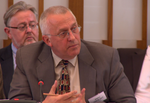
all the session in: version originale bilingue français english
tags
ICTR beginningsJames STEWART
transtlated version
Thank you very much. I think I raised the issue of training. I believe that is the issue you would want me to tackle immediately. So I am probably going to discuss my personal experience in the development of the Tribunal from 2004 to 2007 in specific respect to the establishment of appeals teams. When I came to Arusha I believed it was important to set up training programmes because we had lawyers with various backgrounds; those who had been dealing with human rights; those who had been working in Chambers; those who were academics and other lawyers who were seasoned lawyers in court. So we came up with a training programme for the (...)J.P. GETTI
On that issue of team training and investigation training, is there anybody willing to say something? Yes, please.
-
contribution 03 - ARBIA Silvana
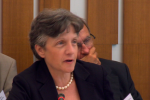
all the session in: version originale bilingue français english
tags
Whom to prosecute?Silvana ARBIA
transtlated version
Thank you very much. It is not dealing with training per se, but it is about the need to put a link between investigations and the prosecution. At the beginning of our work as a Prosecutor, we had to deal with the simultaneous work of the investigator and the prosecutor who was in charge of preparing the case. The investigator will collect the material and prepare the file, but it was not linked with the Prosecution strategy, I mean the case as would be presented in court. As we began together with Mrs Del Ponte, she was the chief Prosecutor, we thought to give an additional duty to the senior trial attorney, that is, to lead the (...)J.P. GETTI
In the forms that were handed out this morning, there were some questions that relate to what you have said, and they also come to supplement your statement. This morning the term a "big fish" was used. What is a "big fish" to the International Criminal Court? What is the criterion used? This issue of a "big fish" appeared also at the ICTY. So, which are the criteria to determine that the case is about a “big fish”?
Mr Othman, I think you raised that question in your memo.
-
contribution 04 - OTHMAN Mohamed
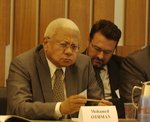
all the session in: bilingual original version français english
Mohamed OHTMAN.
original version
Thank you very much. I think one of the biggest issues in the evolution of the Prosecution strategy in OTP in the Rwanda Tribunal, when investigations began whether in Yugoslavia or in the Rwanda Tribunal, was the approach that is the investigations of executors who would lead to top ranking accused. That was this policy that was adopted during the first two years. But the situation then evolved depending upon the investigations. And the second phase was, when the Prosecution came up with a position, having had a look on the type of atrocities that were committed. Because in the case of Rwanda, for example, you had, from the time 1996 (...)J.P. GETTI
Mr Reyntjens, please.
-
contribution 05 - REYNTJENS Filip
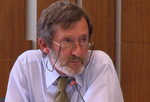
all the session in: bilingual original version français english
Filip REYNTJENS
original version
This, I think, raises a much larger issue which I would like to have on the agenda. What I am going to say is known to most of you, but I think we need to put this on the agenda. As I said, it’s a major general, I would say, almost an ethical weakness. This morning during his open remarks, President Byron said, and I quote you almost textually, "Crimes cannot be committed on the State with impunity." This is the message given by the ICTR. That is what you said this morning. I would say, yes, that is only partly true, if committed by the victor, these crimes can be committed by impunity. And that is what we see. So that is (...)J.P. GETTI
Thank you. Well, we should also try to cut down on what we have to say. There are so many persons who want to intervene. That is the recommendation that I was asked to do. Mr Prosper, did you want to take the fore or Mr Muna? Mr. Muna first.
-
contribution 06 - MUNA Bernard Acho
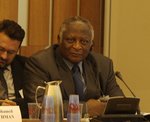
all the session in: bilingual original version français english
Bernard MUNA
original version
I will be turning to my friend Reyntjens. I probably will start with his comments because it goes to the root of what he is thinking. I do not believe that the Tribunal was created to be an arbitrator between the RPF and the Hutu government and so forth. So we keep on talking about the impartiality. It was not the job of the Tribunal to be a referee between the two warring factors in Rwanda. My friend Reyntjens has stuck to this idea of impartiality between the two groups. That was not the job of the Tribunal. The Tribunal was made to get people who had committed genocide and high crimes and punish them without any impartiality. (...)J.P. GETTI
Thank you, Mr. Muna. Mr. Prosper, please.
-
contribution 07 - PROSPER Pierre-Richard
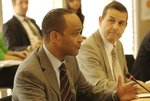
all the session in: bilingual original version français english
tags
RPF prosecutionPierre-Richard PROSPER
original version
Thank you, Mr. Chairman. First, before we begin, I would like to thank the organisers of the Conference. I think this is an impressive and incredible collection of experts and persons who have been committed to these issues for 15 years or more and have actually made a difference to humanity. So, again, I want to applaud the organisers for this and thank you for inviting me. What this has done and what this will allow us to do for the next few days is to have retrospective to learn the lessons from that work, both positive and negative. And I think one of the things that we need to keep in mind as we go through this, particularly (...)J.P. GETTI
Cécile Aptel ?
-
contribution 08 - APTEL Cécile
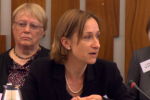
all the session in: version originale bilingue français english
tags
ICTR beginningsCécile APTEL
transtlated version
Thank you. I would also like to take my turn to thank the organisers of this committee which is totally exceptional on many counts. To remain in the realm of the Prosecution policy of the ICTR, I think it is proper to go into the roots of the establishment of the International Criminal Tribunal for Rwanda following the crimes committed in 1994. For the record, the ICTR was set up for two reasons. First of all, to act as an impartial judge in trying the crimes committed in Rwanda, but also because there was a lack of capacity and resources in Rwanda. And I’m going to revisit the two points, because they are important to illustrate the (...)J.P. GETTI
It is 15h40. Do we need to take the break now? We will break off now and reconvene at 4 p.m. If it is possible, we need to end our break at 4 p.m. so we can resume right on time.
(Recess from 3.40 p.m. to 4 p.m. )
-
contribution 09 - GETTI Jean-Pierre

all the session in: version originale bilingue français english
Jean-Pierre GETTI
transtlated version
Please, we would like to resume our proceedings. Please, kindly take your seats so we can start. Before giving back the floor and in continuation with the discussion that we had before the coffee break in relation to a few investigations which were not conducted, especially with regard to the RPF, we could also wonder why some investigations were not conducted into the family of President Habyarimana. Would somebody like to say something in that respect? Because that is also part of the prosecution strategy. Why were they not done, these investigations? If there is nobody I want to throw the floor open. Yes, please Mr (...) -
contribution 10 - EBOE-OSUJI Chile
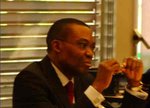
all the session in: bilingual original version français english
tags
RPF prosecutionChile EBOE-OSUJI
original version
I want to make very plane that I’m not a judge. As I was registering, I noticed in the column they indicated me as judge. I crossed it out just to be sure. I’m a senior legal officer in Chambers. The reason I’m getting involved in this exciting discussion is I was quite interested in what Professor Reyntjens had to say. I thought I should perhaps come in from the perspective of someone who was in the OTP in 1997, 1998, 1999 with Pierre Prosper, who is sitting there, with Mr. Muna and Mr. Othman. Mr. Othman this morning spoke about the strategy in the OTP Prosecution strategy at the time. And he spoke to some of the components of it. (...)J.P. GETTI
Thank you. Please, Mr. Lurquin
-
contribution 11 - Lurquin Vincent
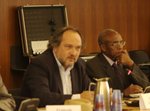
all the session in: version originale bilingue français english
Vincent LURQUIN
transtlated version
Thank you, Mr. President. Well, I want to take the floor because I don’t want the Prosecutors to get used to speaking alone without the lawyers responding. I will be brief because we do agree on what Mr. Reyntjens has said. I will not go back to it. I want to raise a semantic problem. Some of the Prosecutors talked about the investigations difficulties and others raised the issue of policy. But can one talk about investigations and policy at the same time? Regarding the prosecution theory, I believe Mr Karegyesa will recall that the first person he gave me in the Bagambiki case was an investigator called Mr. Paul Dorbie. On (...)J.P. GETTI
I don’t know who wants to take the floor precisely. Kwende, Mr. Kwende, please. You have asked to take the floor, please.
-
contribution 12 - KWENDE Alfred

all the session in: bilingual original version français english
tags
Prosecution strategyAlfred KWENDE
original version
Thank you, Mr. Chairman. I was going to take the floor for more extensive things, then I discovered that we have a session tomorrow, during which I will have much more to say. However, I thought I should say something on a few matters related to investigations which I thought were not revealed or said in the difficulties of getting the Prosecutions in place. It’s just been glossed over, but a major difficulty we need to understand is that the investigations section of ICTR is the only main office of the OTP in Kigali, therefore, placed at the scene of the crime. There is a major difficulty going around to conduct investigations. (...)J.P GETTI
Mr. Nsensigmana.
-
contribution 13 - NSENGIMANA Nkiko
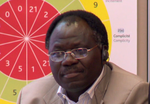
all the session in: version originale bilingue français english
Nkiko NSENGIMANA
transtlated version
Thank you. I was fortunate to have been part of the first conference on Rwanda in August 1994 in The Hague after the report of Mr. Degni Ségui, which recommended the setting up of the International Criminal Tribunal for Rwanda. But before I ask specific questions to the Prosecutors, both ladies and gentlemen, I would like to explain a few things. The creation of the criminal tribunal in Rwanda was not due to the underdeveloped nature of the structures in Kigali. It was first of all because there was the quest for neutrality and a measure of the impartiality. Secondly, I remember back then that when the first ideas were mooted, we should (...)J.P. GETTI
Now, maybe the Prosecutors. Yes, Mrs. Del Ponte.
-
contribution 14 - DEL PONTE Carla

all the session in: version originale bilingue français english
Carla DEL PONTE
transtlated version
I would like to take the floor with your leave, and I will begin with the questions and then I will end with the Prosecution policy. We’ve heard a number of arguments, and they are all good. You know, the first thing you have to do as a Prosecutor is to establish the facts before you start working. So you need to know how things happened, how the unlawful acts and crimes are committed, establishing the facts. So the first persons you need to have are analysts with whom you discuss the facts. That is a whole lot of work before you undertake or conduct an investigation, understanding the facts. So you are saying that ^Tadic was an (...) -
contribution 15 - WEBSTER Don
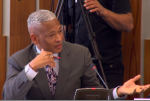
all the session in: bilingual original version français english
Don WEBSTER
original version
I would like to thank Madame Del Ponte for her response. Actually, I was about to say the same thing, which is that we try to make this distinction between small fish and big fish. When we started the Tribunal in ’95, we had to start with anything that was available, whether it was a big fish or a small fish. Anything that would get the operation started was how things started. It was our great good fortune that Akayesu fell into our hands fortuitously, because that was the best place to start in terms of getting the trials and the investigations up and running in Rwanda. I think 50 years from now we’ll look back and we’ll have even (...)J.P. GETTI
François-Xavier Nsanzuwera, et ensuite, Madame Haskell.
-
contribution 16 - NSANZUWERA François-Xavier
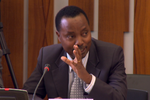
all the session in: version originale bilingue français english
Fançois-Xavier NSANZUWERA
transtlated version
Françcois-Xavier Nsanzuwera from the appeals in the office of the Prosecutor. I would like to backtrack a while, based on this afternoon’s statements in respect to Prosecution policy. I believe that we need to include a stakeholder who might believe it’s not properly represented here namely the witnesses. Tomorrow we are going to discuss the legacy of the Tribunal, as well as jurisprudence, but I believe that the work of the Tribunal or the book of the Tribunal was written by an important stakeholder, namely, witnesses, witnesses who testified for the Prosecution, who testified for the Defence as well. And I take it that the witnesses, (...)J.P. GETTI
There are some persons who had sought to take the floor.
Mr. Webster, I’m going to talk to you I’ll let you have the floor. -
contribution 17 - HASKELL Leslie

all the session in: bilingual original version français english
tags
Prosecution strategyLeslie HASKELL
original version
I would like to discuss some comments made by Ms. Del Ponte and by Don Webster. Actually, with respect to sort of this strategy call and recognising sort of the legal standards that you’re working with, the fact that you do need proof, looking also at the political constraints within which you’re working, certainly more if you look all the way back to ’94, ’95 versus where we’re at today, I think it’s interesting. I would welcome Prosecutor Jallow’s thoughts on it, in terms of this evolution of strategy and how we’ve gotten there. Because I do think that this was a revolutionary process, and so of course there’s going to be some changes made (...)J.P. GETTI
Certains voulaient demander la parole. Je prends note. Monsieur Webster, et Monsieur Roux, s’il vous plaît.
-
contribution 18 - WEBSTER Don

all the session in: bilingual original version français english
Don WEBSTER
original version
I would like to raise an issue and that actually goes back to the comments from Madame Del Ponte when she explains that she opened an investigation against the RPF and sought the cooperation of the Rwandese. Now, that statement in and of itself shows you the complexity of running an office of the Prosecution or running an ad hoc Tribunal. Because I would view that as a very civil law approach to Prosecution, because given my background, I would never announce to the person that I’m investigating that I’m starting an investigation against you. From the American version of common law practice, we would investigate, we would develop a file (...)J.P. GETTI
Maitre Roux, s’il vous plait.
-
contribution 19 - Roux François
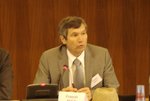
all the session in: version originale bilingue français english
François ROUX
transtlated version
Thank you, Mr. Chairman. I was going to talk, actually, about civil law to tie in with what the previous speaker had said, but I don’t think that civil law can be responsible for the failure of the special investigations. That is something new, Mr. Webster. Now, two points. First, I would like to thank Carla Del Ponte for her clear language. Well, I believe, I’m sorry to say this, but it is a change from the kind of rhetoric that we’ve been hearing since the early afternoon. Thanks to Del Ponte, it is clear that if the investigations were not concluded, it has to be blamed on political reasons. Let’s state the problems clearly and (...)J.P. GETTI
First, for purposes of information, we have a civil law system in France that we ourselves are challenging.
Now, I would like to give the floor to Mr. Cruvellier, if you don’t mind. -
contribution 20 - CRUVELLIER Thierry
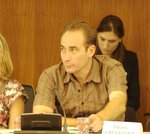
all the session in: version originale bilingue français english
tags
RPF prosecutionThierry CRUVELLIER
transtlated version
Thank you. Thierry Cruvellier. Well, journalists are used to making fun, but I would like to say thanks this time to Madam Del Ponte and Mr. Roux precisely for what he has just said. I believe that what we need to do is to address this ^internal problem of the international courts is that they are in a political context. So it does not help if we continue to justify failures or issues related to jurisdiction, the common law, civil law dispute. That is not the case. Yes, let us rehabilitate our policy and see what the ICTR has taught us. We could go further and say it is all very well to acknowledge this and be humble, but what do (...)J.P. GETTI
Thank you. Madame Condé, you have the floor now.
-
contribution 21 - CONDÉ Aïcha
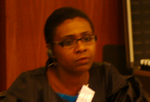
all the session in: version originale bilingue français english
Aïcha CONDÉ
transtlated version
Thank you. I would like to express the standpoint of the Defence on the consequences of the Prosecution strategy. As far as I’m concerned, and for many of us, we have always tried to protect our clients and prevent the Tribunal from being some kind of forum. But 15 years on, the fact that no RPF member has been prosecuted, it’s hardening our clients and making the Tribunal some kind of forum, a rostrum, a stand for them to express themselves, whereas we are told you have an indictment, you have to stick to the indictment. And then they respond that in the transcripts there should be traces of something that people don’t want to say. (...) -
contribution 22 - ESSOUNGOU André-Michel

all the session in: version originale bilingue français english
tags
Politics & JusticeAndré-Michel ESOUNGOU
transtlated version
I just want to specify one thing. For a journalist, I have been able to be here, but maybe we have had this discussion in many trials and there is this depressing sense of familiarity. Now, it would be proper for the Prosecutor to take the floor, but I wonder, are we in the right room or the right players to answer this question? One wonders finally, what has politics done? Has it shaken some form of support? No. The court was created by the United Nations, which imposed some limits on it. The limits were the outcome of a political debate. So we had some of these discussions at the Security Council, which decided on the limits of (...)J.P. GETTI
Mr. Vandermeersch, please.
-
contribution 23 - VANDERMEERSCH Damien

all the session in: version originale bilingue français english
Damien VANDERMEERSCH
transtlated version
I would just like to say a word to add to the explanations we’ve received on the fact that there are some loopholes. Well, it is not the sole preserve of the ICTR. Even the ICC, I’m waiting for a day when they will look on the other side. Well, we are in the middle ages of international justice. This is the embryonic stage. I think it’s the beginning of justice. Let us be here as if we are in the middle ages of international justice. And as long as the problem of the separation of powers has not been addressed at the international level, while it is still captive to the balance of power, I will say let us move towards majority (...)J.P. GETTI
Mr. Prosper, you have the floor.
-
contribution 24 - PROSPER Pierre-Richard

all the session in: bilingual original version français english
tags
Politics & JusticePierre Richard PROSPER
original version
I just wanted to try to provide an answer for Ms. Haskell. This is something that everyone knows has dramatically influenced Prosecution strategy, that is the completion strategy and I think I bear some responsibility. It was a completion strategy that really pushed for national prosecutions, both in Rwanda as well as the Yugoslavia. I know Madame Del Ponte got tired of hearing from me on this issue, as well as Prosecutor Jallow. But that was a main fact. Just a quick point on the politics. The politics works both ways. It can obviously be a detriment, but it can be helpful. One of the things that we did, and both Tribunals came (...)J.P. GETTI
Monsieur Guichaoua
-
contribution 25 - GUICHAOUA, André
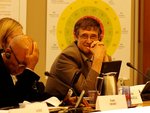
all the session in: version originale bilingue français english
André GUICHAOUA
transtlated version
I would like to broaden the issue of Prosecution strategy or policy. From 2001 through to 2003 there were lists that had various names running up to 240 names of persons who could be prosecuted suspects. So my question is, today some persons at the height of those lists have decided not to give themselves up or they have decided to get themselves ^arrested but the momentum was such that they could not escape. In the light of the track record today, 70 per cent is prosecuted. My question is quite ^banal. Now, the 250 others, what happened to them? Those who were arrested, were those the easiest to be arrested because they could not (...)J.P. GETTI
It is 5:25 p.m. We are drawing the close of this afternoon’s sessions. Professor Reyntjens, you need to talk.
-
contribution 26 - REYNTJENS Filip

all the session in: version originale bilingue français english
tags
RPF prosecutionFilip REYNTJENS
transtlated version
Thank you. First of all, let me reassure you that Pierre Prosper and myself, I noticed that we are indeed in harmony in respect of the essential point, since there was a draft agreement which was never finalised and so the RPF was not suspected by Rwanda, and that did not happen. And I think that is what matters. Now, I would like to revisit before that, there were a number of statements this afternoon which were, to say the least, wonderful. We have had 21 statements. Now, let me revisit something that was stated by Don Webster, which is interesting. He said we would have been more efficient if the temporal jurisdiction was (...)J.P. GETTI
Mr. Kamilindi and then Mr. Jallow if he wishes.
-
contribution 27 - KAMILINDI Thomas
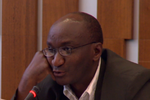
all the session in: version originale bilingue français english
tags
Prosecution strategyThomas KAMILINDI
transtlated version
My name is Thomas Kamilindi. I’m a journalist with the Voice of America in Washington. I witnessed well, I testified in the Media case and I waived my protection. And let me state that my daughter, who was five in 1994, was killed. And this is the basis of my question. Those who are being tried this is a question to the Prosecution or Office of the Prosecutor or to Prosecutor: Those who are being tried did not really take up the machetes. Can there be prosecution for moral responsibility? Because there was a moral responsibility issue in all what prompted the genocide. There were decisions that had been taken by persons which (...)J.P. GETTI
Mr. Stewart, quickly, please.
-
contribution 28 - STEWART James

all the session in: bilingual original version français english
tags
ICTR assessmentJames STEWART
original version
There are lot of issues that we have not discussed, which I thought we might have. As a matter of fact, coming out of issues like “acte d’accusation” and other practical lessons that we might have tried to examine instead of the great questions that have been debated. But I think the great questions are important, and I just want, on this theme, to close with this remark. I agree that we have to be humble and that an attitude of humility is important. We are dealing with the art of the possible. I understand that. But I think that if we can say that we brought to justice a number of people responsible for the deaths of half a million (...)J.P. GETTI
Merci. Je n’ai plus d’orateur. Monsieur Othman, est-ce qu’on prolonge la séance ou est-ce qu’on la clôt à la suite de cette intervention ? Quelles sont les instructions des organisateurs ? Monsieur Othman, s’il vous plaît.
-
contribution 29 - OTHMAN Mohamed

all the session in: bilingual original version français english
Mohamed OTHMAN
original version
Just two very small remarks. One is about the investigation of the presidential plane. In my view, I don’t think that the Rwanda Tribunal is a tribunal that will be judged negatively because of the non investigation of the presidential plane. Leave alone the jurisdictional issue. That is debatable. Even if the Tribunal had jurisdiction, there were factors that led to the non investigation. It was not that there was no follow up to that investigation. Contacts were made. There was attempt by investigation, you know, the Michael Hourrigan affair, attempt. But a conscious decision was taken that the Tribunal, much as we have a tracking (...)J.P. GETTI
Maître Roux.
-
contribution 30 - Roux François

all the session in: version originale bilingue français english
tags
ICTR assessmentFrançois Roux
transtlated version
A short one. Let me just stat that when I said we should be humble, generally I filled my glass half full. Our glass is only half full, so we may be satisfied with what is failed. But we should also look at the empty part of the glass. As I heard Mr. Augustin say the other day, let us admit that our international criminal justice is still a newborn. Let’s admit that fact. And let’s say clearly to public opinion. That is what I call modesty. Yes there have been major strides, but unfortunately we have not covered the full ground yet. We have not met our expectations (...) -
contribution 31 - KWENDE Alfred

all the session in: bilingual original version français english
tags
Whom to prosecute?Alfred KWENDE
original version
I’m just going to answer one of the questions addressed by Pr. Guichaoua. It was why the lists left from 350, 250 and came down to nothing. We must remember that in 2003, the mandate of the Tribunal was determined. We started a list of people to investigate and let’s be factual and say that that list did not mean like other speakers have said that we have sufficient submission evidence on them. There were lists of people who were just suspects and still had to be investigated. The list was reviewed. The resolution says by 31st December 2004 we are supposed to stop all investigations and so could not go beyond that. They reviewed the (...)J.P. GETTI
Nous allons clôturer cette séance maintenant. Merci à tous et à toutes d’avoir contribué à animer cet après-midi.
Merci, à demain. Demain, le début de la séance est à 9 heures.Levée de la session 17h40
Adjourned at 5.40 pm

